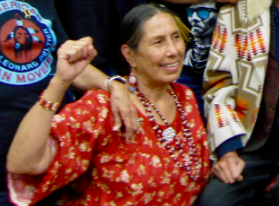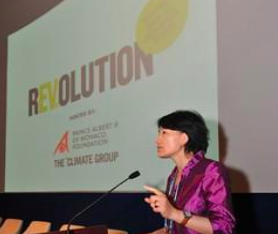Greta Thunberg commanded the world’s attention with the urgency of her words before the 2019 UN Climate Action Summit, bringing to the forefront a conversation about the women who have been leading climate advocacy. While there are countless women who for decades have dedicated themselves to environmental activism, this article provides a shortlist of five women of all ages and walks of life who have promoted the common goal of a more sustainable world through their words and actions.
Dr. Sunita Nahrain presenting at the Stockholm Water Prize Symposium. Stockholm International Water Institute. CC 2.0
Sunita Narain, India: The director of the Center for Science and Environment in New Delhi, Nahrain has worked since the 1980s to build community partnerships focused on mitigating air pollution, as well as promoting food and water security. Nahrain has been a critical voice in the formation of climate policy in India, advising both the Environmental Pollution Authority for the National Capital Region, and a Joint Parliamentary Committee investigating pesticide contamination in foods. For her critical work Nahrain was awarded the World Water Prize in 2005, among numerous other honors throughout her career.
Hindou Omaraou Ibrahim Speaking before the World Economic Forum. World Economic Forum. CC 2.0
Hindou Omaraou Ibrahim, Chad: Ibrahim, a climatologist and environmental activist from Mbororo, Chad, has centered her work on the empowerment of indigenous women. She is the founder of the Association of Peul Women and Peoples of Chad, and was designated as the National Geographic Emerging Explorer in 2017. Ibrahim has spearheaded 3D mapping projects of Chad’s Sahel region, the home of the Mbororo community. The mapping efforts are partnered with UNESCO and the government of Chad, and are collecting thorough data regarding indigenous subsistence farming and environmental concerns, especially the drying of Lake Chad.
Casey Camp-Horinek, Wounded Knee AIM veterans. Neeta Lind. CC 2.0
Casey Camp-Horinek, United States: Camp-Horinek is a vocal environmental and indigenous rights activist on the behalf of the Ponca Nation, whose native land is located in the state of Oklahoma. Her advocacy deals directly with supporting grassroots activism against harmful industry practices such as fracking, and the construction of the Keystone XL natural gas pipeline. Camp-Horinek has dedicated herself to creating a platform for indigenous voices, serving as a board member for WECAN and presenting before the UN Forum on Indigenous Issues.
Shalvi Sakshi, Fiji: Sakshi, a twelve-year old climate activist from Bua, Fiji, served as the youngest panelist, then ten years old, for the 23rd Conference of the Parties to the UNFCCC in November of 2017 in Bonn, Germany. Sakshi urged of the dangers of rising sea levels due to deforestation and industrial contribution to rising carbon dioxide emissions. Her message is one of empowerment, emphasizing that everyone maintains the capacity and obligation to improve his or her world.
Changhua Wu Speaking before an EV20 Shanghai Media Event. The Climate Group. CC 2.0
Changhua Wu, China: Wu is an environmental advocate and social entrepreneur, who serves as the founding CEO of the Beijing Future Innovation Center and as the China/Asia Region Director for the Jeremy Rifkin Office. Wu has contributed extensively to important strides in clean energy policy in China, and has been recognized globally for her impact in the lowering of China’s carbon footprint. Combining her extensive background in economics, environmental policy, and journalism studies, throughout her career Wu has tied together sustainable technology, social entrepreneurialism, and environmental policy.
HALLIE GRIFFITHS is an undergraduate at the University of Virginia studying Foreign Affairs and Spanish. After graduation, she hopes to apply her passion for travel and social action toward a career in intelligence and policy analysis. Outside of the classroom, she can be found, quite literally, outside: backpacking, rock climbing, or skiing with her friends.





